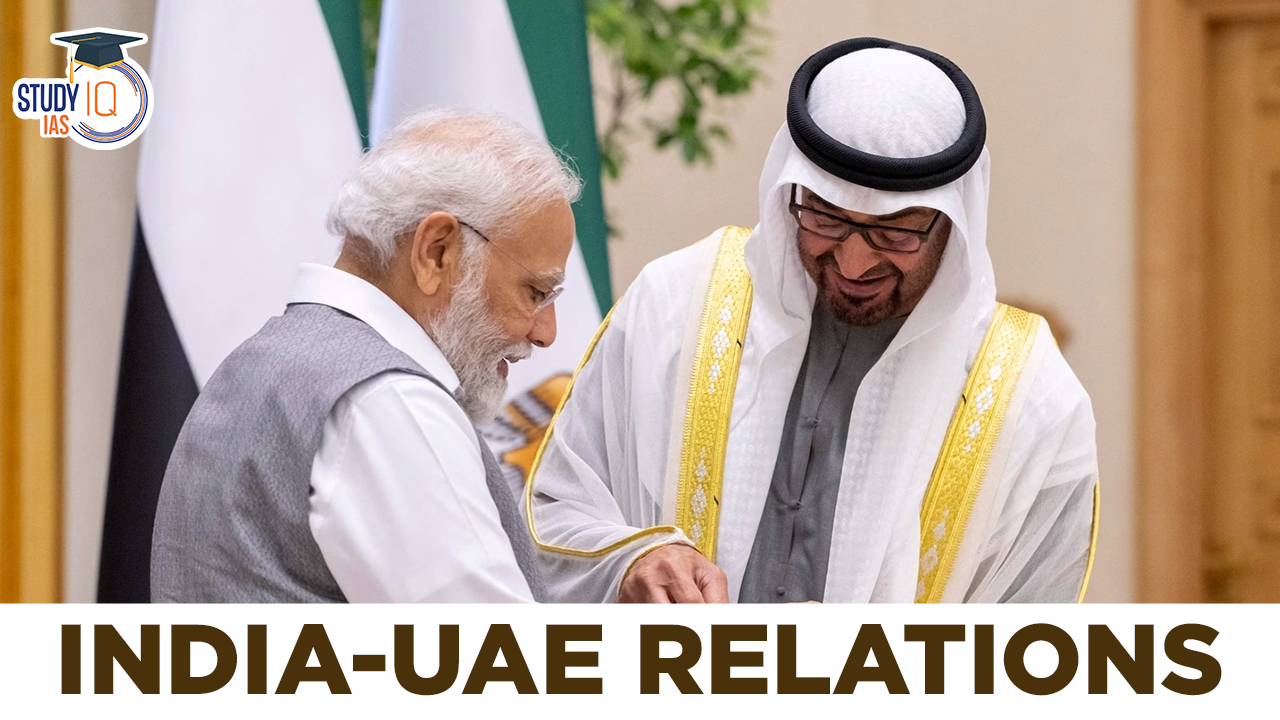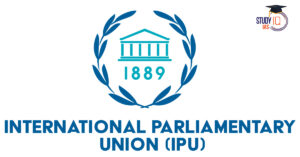Table of Contents
Context: The crown prince Sheikh Khaled of Abu Dhabi recently visited New Delhi.
India and UAE Relations
- The relationship is deeply rooted in historical connections, with archaeological evidence of trade with the Indus Valley Civilisation.
- Post Independence, the relationship flourished after the accession of H.H. Sheikh Zayed Bin Sultan Al Nahyan as the Ruler of Abu Dhabi in 1966 and subsequently with the creation of the UAE Federation in 1971.
- Since then, both sides have made sincere efforts to improve relations in all fields.
Recent Developments Between India and UAE
- Cultural and Religious Exchange: The inauguration of a grand Hindu temple in Abu Dhabi signifies deepening cultural ties and respect for the religious diversity of the Indian community in the UAE.
- UAE citizens often seek Indian medical expertise, including homoeopathic treatments.
- Indian Diaspora: The UAE is home to over 3.5 million Indians, contributing significantly to the UAE’s economy and cultural diversity.
- Economic Partnership: The launch of Bharat Mart by DP World and India’s Ministry of Commerce and Industry in Dubai’s Jebel Ali Free Zone Area aims to boost exports from Indian Micro, Small and Medium Enterprises, showcasing products to access wider markets in the Middle East and beyond.
- Digital and Financial Collaboration: India and the UAE have formalised agreements to connect their digital payment systems, which will facilitate the integration of digital platforms like UPI, credit and debit card transactions, and interbank transfers, enhancing trade and investment flows between the two nations.
- Trade Agreements: In February 2022, India became the first country with which the UAE signed a Comprehensive Economic Partnership Agreement.
- It has significantly increased trade between the two nations, with a 16% growth bringing the trade volume to $85 billion.
- Investments and Infrastructure: With rising UAE investments in India, and initiatives like the Abu Dhabi Investment Authority opening an office in Gujarat’s GIFT City, the economic ties are further strengthened.
- India and the United Arab Emirates (UAE) have signed a pact to establish Local Currency Settlement System (LCSS) to promote the use of the Indian rupee (INR) and UAE Dirham (AED) for cross-border transactions.
- Energy Security: Agreements such as the one between Indian Oil Corporation Limited and the Abu Dhabi National Oil Company for liquefied natural gas purchases underline the energy cooperation between the two countries.
- Education and Research:
- IIT Delhi Abu Dhabi: Sheikh Khaled inaugurated the branch of the Indian Institute of Technology (IIT) Delhi in Abu Dhabi.
- This will be the second international IIT campus after IIT Madras Zanzibar, Tanzania.
- IIT Delhi Abu Dhabi: Sheikh Khaled inaugurated the branch of the Indian Institute of Technology (IIT) Delhi in Abu Dhabi.
Challenges in India-UAE Relations
- Lack of clarity and transparency: Indian companies operating in the UAE often face challenges due to a lack of clarity in commercial regulations and labour laws.
- Issues concerning the Indian diaspora: Indian migrants in the UAE face cumbersome and strict regulations, particularly in relation to Emirati employers. Problems such as favouritism towards workers of other nationalities and a slight drop in remittances inflow from the UAE to India have been observed.
- Influence of the Pakistan factor: Historical and civilizational ties between India and the Gulf region are strained due to the influence of the Pakistan factor.
- Political relations are affected by tensions between India and Pakistan, which impact India’s relations with countries in the region.
- Balancing geopolitics: India’s relations with Iran and the UAE’s relations with China create a dynamic where geopolitical considerations can sometimes challenge the bilateral relationship between India and the UAE.
- Energy pricing disagreements: As an OPEC country, the UAE has a different perspective on energy pricing compared to India, a major oil consumer. Disagreements over energy pricing, including India’s call for a cap on prices, have led to heated exchanges between oil ministers in the past.
- Air services agreement: India and the UAE have yet to renegotiate their air services agreement.
- The UAE seeks to increase the number of flights and destinations to India, while India maintains certain caps to protect its domestic airlines.
- This issue has been a source of contention between the two countries.
Way Forward
- Capacity Building of local administration to ensure faster compliance and ease of doing business.
- Better Centre-State coordination can help to sort out issues of infrastructure, energy, and logistics cost.
- Benchmarking of domestic safety and quality standards with global standards for quality manufacturing and avoiding dumping of lower quality hazardous goods in India.
- Diversifying Indian exports in terms of markets and products and services to achieve scale and to overcome demand and price sensitivity issues.
- Strengthening coordination between exporters and government through a hand-holding approach to provide guidance on the UAE market and CEPA.
- Example: Indian Missions in UAE and its diaspora can be used for market awareness and in building networks.


 SAMARTH Udyog Bharat 4.0: Transforming I...
SAMARTH Udyog Bharat 4.0: Transforming I...
 BHIM 3.0 Launched by NPCI: Key Features,...
BHIM 3.0 Launched by NPCI: Key Features,...
 150th Summit of Inter-Parliamentary Unio...
150th Summit of Inter-Parliamentary Unio...





















